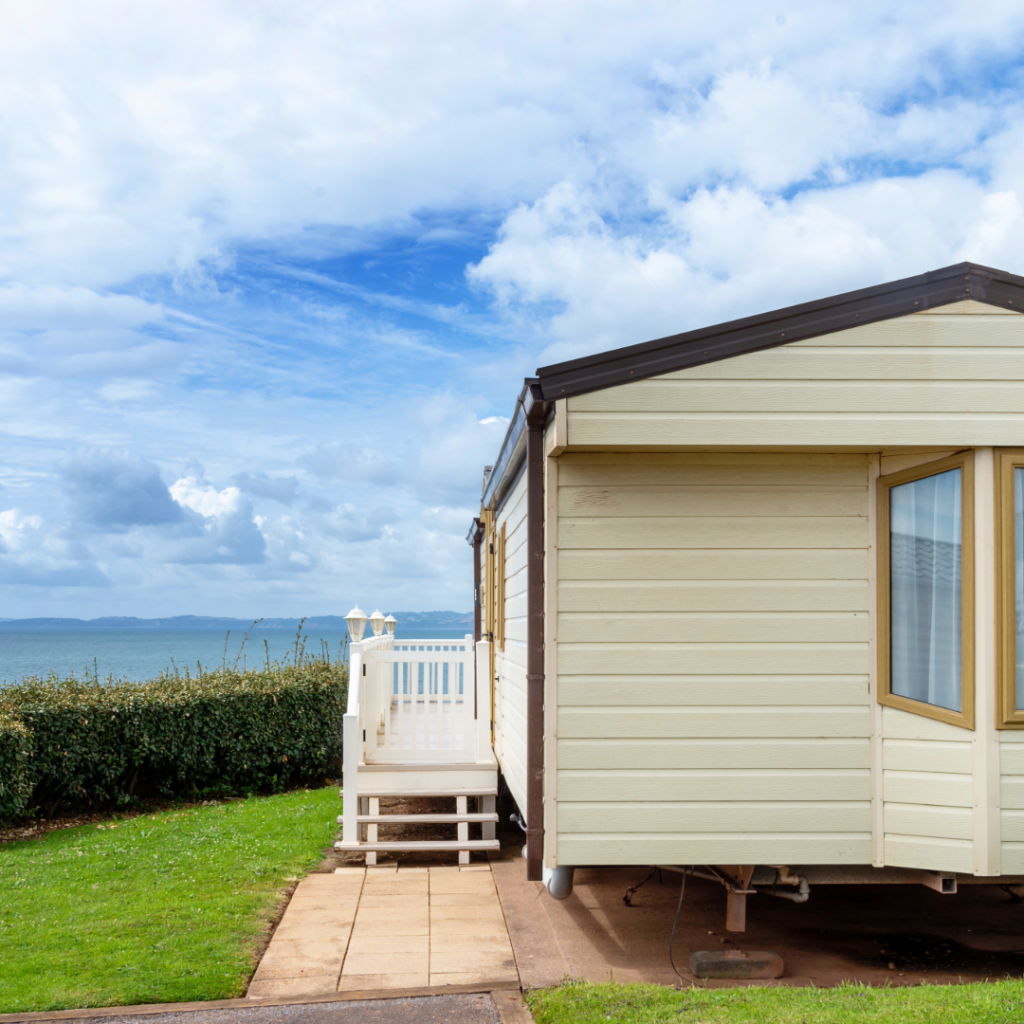
What is mobile home insurance?
Mobile home insurance, or manufactured home insurance, is a type of insurance that covers any dwelling that falls under the manufactured home definition. These homes always have a HUD label and are typically built on a metal frame and delivered as a completed unit. Insurance for mobile homes may cover repairs to the structure of your home and/or replacement of the utilities that came with your home.
Mobile home insurance is considered the equivalent of homeowner’s insurance for owners of manufactured homes. According to the U.S. Census Bureau, the average price of a new mobile home was $127,300 in 2022, the latest year for which data is available, while the average sale price of a new house was $540,000. Although manufactured homes are typically much cheaper to buy, it’s still important to have mobile home insurance coverage to protect your investment and family’s finances. After all, many people don’t have $120K-plus in disposable income to replace their home in the event it is destroyed.
What does mobile home insurance cover?
Mobile home insurance provides coverage for the following essentials:
- Dwelling coverage: This coverage is for the dwelling and other permanent structures on the property. In other words, any damage done to your home or other structures on the property (like a deck, garage or shed) that are listed in your policy is covered under your dwelling coverage.
- Personal property coverage: Covers the personal items you own if they are damaged or stolen.
- Liability coverage: This coverage protects you in the event someone is injured on your property and you are held liable. Liability protection may cover legal fees and medical costs up to your coverage limit.
- Loss of use/additional living expenses (ALE): You may need to live somewhere else temporarily while your mobile home is repaired, and this coverage can help cover your temporary relocation costs. ALE may cover hotel costs, rental of a temporary home and restaurant meals after damage from a covered peril.
Some manufactured homeowners opt to purchase peril policies, a type of mobile home insurance with low premiums but high risk. Peril policies cover very limited causes of damage, meaning you will be responsible for any costs not resulting from one of the listed perils. If you’re looking into a peril policy, it is best to understand the full scope of what is and isn’t covered, and ensure you can afford the full cost of repairs that are not covered.
What does mobile home insurance not cover?
Standard mobile home insurance policies have several exclusions. Some of these require add-ons or separate policies for coverage and may or may not be needed depending on your geographic location:
- In-transit damage
- Flood insurance
- Earthquake insurance
- Windstorm insurance
Is mobile home insurance required?
Mobile home insurance is not required by law, but lenders may require it as a condition of the loan. Some mobile home parks have requirements for insurance coverage, as well.
How much is mobile home insurance?
Since mobile home insurance is less common than a standard homeowners insurance, you may be wondering how much the average policy costs. The answer depends on several factors, such as your insurance company, your location, the type of mobile home and more. Each insurance company has its own way of underwriting policies, but most will calculate rates based on risk.
Mobile home insurance policies often cost more than standard homeowners insurance policies due to the higher risks associated with manufactured homes. While the average cost of mobile home insurance nationwide is not available, the best way to estimate how much you’ll pay is by shopping around and comparing coverage options and quotes.
Some of the things that may impact your cost of coverage include:
- Your location
- Weather risks, including hurricanes, tornadoes and floods
- Wildfire risks
- The crime rate in your neighborhood
- Proximity of first responders, such as police and fire departments
- Value, age and condition of your mobile or manufactured home
- Policy limits for basic coverage: dwelling, liability and personal property
- Additional coverage types, such as flood, earthquake and windstorm
- Deductible levels
How to save money on a mobile home insurance policy
Regardless of your mobile home insurance rates, there are several ways to potentially earn discounts on your mobile home insurance. Some of these discounts are straightforward and can be applied to lower your annual premium. Common discounts include:
- Being the original titleholder of the mobile home
- Bundling your mobile home insurance with other policies, such as auto insurance, through the same insurer
- Installing a home security system
- Retirement and/or senior discounts
What is the difference between mobile home insurance and standard home insurance?
Mobile home insurance is different from standard homeowners insurance coverage because of the major structural differences between the dwellings being covered. While a traditional home is attached to a foundation, mobile homes do not have the same structural foundation. Although mobility can be convenient, it comes with a few more inherent risks due to the lack of a foundation, which makes it easier for a mobile home to be impacted by natural disasters and be prone to other hazards.
For instance, fires, wind and broken pipes pose a bigger threat to a mobile or manufactured home than to a traditional home. Mobile homes are also more likely to be targeted for theft. On the other hand, the total value of a mobile home is usually lower than a traditional home. Regardless, since they carry such distinct risks, insurers prefer to group mobile homes into their own type of policy.
To read the full article, click here.